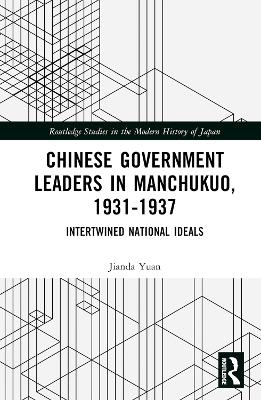
Chinese Government Leaders in Manchukuo, 1931-1937
Routledge (Verlag)
978-1-032-41370-9 (ISBN)
The war in Asia between 1931 and 1945, and particularly the early years of the conflict from 1931 to 1937, is a topic of world history that is often glossed over or misinterpreted. Much of the research and public opinion on this period in China, Japan, and the West deem these Chinese figures to be traitors, particles of Japanese colonialism, and collaborators under occupation. In contrast, this book highlights the importance of analyzing the national ideas of Manchukuo’s Chinese government leaders as a method of understanding Manchukuo’s operating mechanisms, Sino-Japanese interactions, and China’s turbulent history in the early twentieth century.
Chinese Government Leaders in Manchukuo, 1931-1937 fills a gap in this research and is an ideal resource for scholars studying wartime Asia and Europe, as well as non-specialist readers who are interested in collaboration in general.
Jianda Yuan is a visiting research scholar at the National Institute of Japanese Literature. His research interests pertain to modern China and Japan, with a particular emphasis on Manchuria in the 1930s and the 1940s. His recent work is "The Manchukuo Young Girl Envoys and Their Visit to Japan" (2022).
Introduction: Deconstructing the Intertwined Chinese National Ideals of Manchukuo 1. Contested Japanese Ideals in the State of Manchukuo: The National Policies of Itagaki Seishirō, Komai Tokuzō, Ishiwara Kanji, and Kasagi Yoshiaki 2. Inviting the Japanese to Help Revive the Manchu Order in China: The Imperial Ambitions of Puyi and Xixia in Manchukuo 3. “Reviled” Loyalists to China’s Imperial and Cultural Order: Zheng Xiaoxu and Luo Zhenyu in the State of Manchukuo 4. Ambivalent Images of Treason and Heroism surrounding Manchukuo’s Two Military Leaders: The Ideals of Zhang Jinghui and Ma Zhanshan 5. Preserving Warlord Manchuria: Yu Chonghan’s and Zang Shiyi’s Service in Manchukuo 6. Reforming China’s Political and Legal Systems Based on Shōwa Japan’s Experiences: Zhao Xinbo and Feng Hanqing as Manchukuo’s Government Leaders Conclusion: Overcoming the National, Ethnic, and Emotional Boundaries in the Study of Manchukuo
| Erscheinungsdatum | 05.04.2023 |
|---|---|
| Reihe/Serie | Routledge Studies in the Modern History of Japan |
| Zusatzinfo | 1 Tables, black and white; 2 Line drawings, black and white; 27 Halftones, black and white; 29 Illustrations, black and white |
| Verlagsort | London |
| Sprache | englisch |
| Maße | 156 x 234 mm |
| Gewicht | 653 g |
| Themenwelt | Geschichte ► Allgemeine Geschichte ► Neuzeit (bis 1918) |
| Geschichte ► Allgemeine Geschichte ► 1918 bis 1945 | |
| Geisteswissenschaften ► Geschichte ► Regional- / Ländergeschichte | |
| Geschichte ► Teilgebiete der Geschichte ► Wirtschaftsgeschichte | |
| Sozialwissenschaften ► Soziologie ► Spezielle Soziologien | |
| ISBN-10 | 1-032-41370-0 / 1032413700 |
| ISBN-13 | 978-1-032-41370-9 / 9781032413709 |
| Zustand | Neuware |
| Haben Sie eine Frage zum Produkt? |
aus dem Bereich


